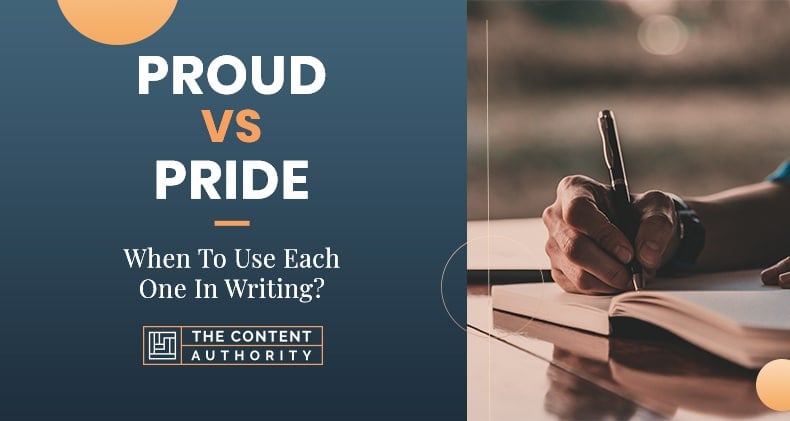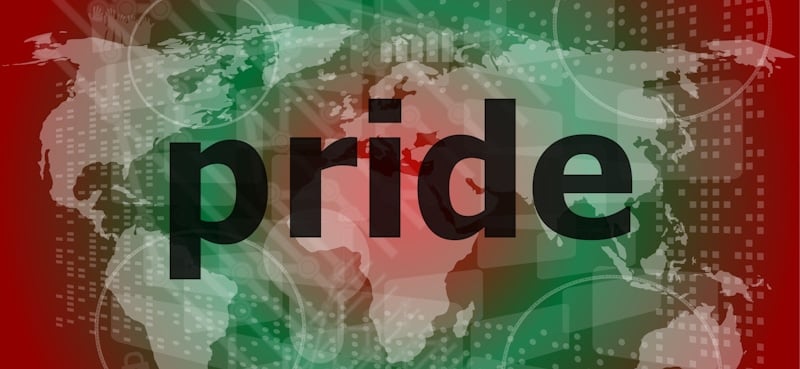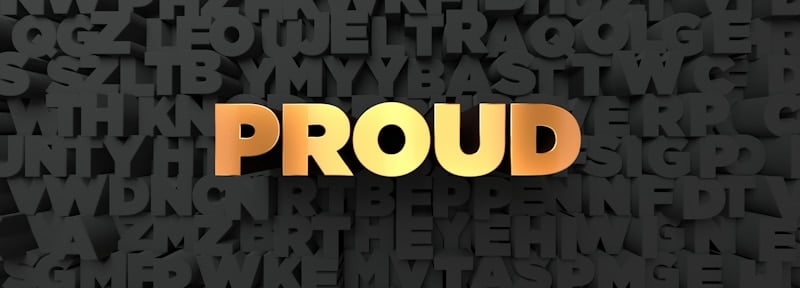Reaching a goal is one of the most satisfying feelings a person can have. Regardless of the time it took, or how insignificant it may seem to others, checking something off a list always gives great pleasure. Now that it is done, do you feel pride or proud?
“Pride” and “proud” talk about the satisfaction of one’s or someone else’s achievement. When used correctly, they express the same thing. “Pride” is a noun and is less frequently used as a verb, whereas proud is an adjective. A person can be proud or have pride, but not vice versa.
Both words refer to a feeling of worth, but they are not the same. One is used to talk about how a person is, and the other can be used as a noun, an abstract feeling, and less commonly as a verb. They are not meant to be used interchangeably, despite how similar they seem in writing.
Proud Vs Pride
“Pride” and “proud” are used in the same context, same conversation, but in a different way. Thanks to grammar and its parts of speech, these two words have different roles in a sentence, but can people separate them? Let’s take a look at their origins and learn how to use them both.
Pride
Pride is a word that is referred to as a noun. It comes from late Old English “pryde,” when combined with modern English “proud,” it makes “pride,” the one used nowadays. As an abstract noun, this word is used to name a person, a thing, or an animal. In its most basic definition, people would use it to name a feeling of pleasure or satisfaction as the result of achieving something.
The word pride can be used in different contexts, such as the ones below.
- When someone is talking about pleasure or joy. She felt so much pride when she crossed the line and realized she was the first to do it.
- When a person has a high feeling of importance. His level of pride is almost narcissistic.
- When a person is referring to their self-awareness. My pride is hurt, but at least I made it through.
The term “pride” as a verb is not as common as its other uses, most likely because it may shed a negative feeling of superiority when used in this way.
- They prided themselves on spending the weekend at a beach house in the Hamptons.
- Jessica prides herself on her parallel-parking skills.
Idiomatic Phrases With Pride
Some idioms and collocation phrases with the word “pride” are shown below:
- My pride and joy. My brownie recipe is my pride and joy.
- Swallow your pride. John should swallow his pride and take their check. He is not going to get anything better than that.
- A blow to someone’s pride. Getting disqualified for the promotion was a blow to Jessica’s pride.
- Do something with pride. Laura likes to show people how she ties her shoelaces. she does it with so much pride.
- Take pride in something. I take pride in my driving skills. I’ve taught all of my children, and none of them have ever gotten a ticket.
More Sentences With Pride
- I take pride in my teaching skills.
- They pride themselves on their MS Excel knowledge.
- The mother was so impressed with her children’s cleaning hacks that she let them watch TV until late last night.
Pride And Other Associations
The term pride has also been associated with patriotism. Patriotism or national pride is the devotion and sense of belonging people may feel about a nation, but not always their country of birth.
It is also popularly associated with the LGBTQ social group. It is known as Gay Pride, which promotes inclusion, importance, and acceptance of lesbian, gay, bisexual, trans, or queer people.
In popular culture, there’s a novel written by the English novelist Jane Austen, called Pride and Prejudice. It is such a famous novel that it has been adapted to both small and big screens a handful of times.
Proud
The word “proud” is used as an adjective according to English grammar. As an adjective, it speaks of the quality of a noun. It can be placed before a noun or at the end of a sentence. Its origin’s from late Old English “prud,” and modern English, “proud flesh,” and the meaning behind this is value. Some examples of the word proud are the following:
- Getting a good grade, it’s not something to be proud of if there’s cheating involved.
- Pickles is a proud mama of seven puppies.
- He stared at his scale model with a proud look on his face.
- Julia is very proud of her son after everything he has accomplished this year.
Phrases With Proud
Some phrases with the word proud are shown below:
- Make someone proud; to make a person feel pleased. Gathering the money to help with the medical bills did make their mother proud.
- Proud as a peacock, someone filled with excessive pride in oneself. She waited upstairs until after everyone had arrived so she could come down the stairs and show off her new dress, proud as a peacock.
- Prided oneself in something. My company has always prided itself on pay equality.
More Sentences With Proud
- You always make me proud.
- Your sales went through the roof. You must feel really proud.
- We were both proud to hear that your design was the one selected for the new building.
More Great Word Vs Word Posts
Examples With Pride And Proud
Sentences, where you can use both words as an example, are shown below:
- Children would go through the age where they learn something for the first time and feel so proud of it that they won’t let others help them. Pride, to children, is a feeling of being intelligent and good.
- I feel very proud of my son. He brought the classroom pet home for the weekend; a guinea pig. Fed him, cleaned his cage, played with him a few times but always very carefully. The teacher’s report said that he was a great caregiver, and he prided himself on that.
- I don’t know who prides themselves more, the student for getting an A on their paper or the teacher who guided him through this. Nonetheless, it’s such a proud moment for everyone involved.
Why Is It Confusing?
It is pretty common to see people using nouns and adjectives interchangeably as their definition seems similar in the English language. A noun assigns a name or defines something, but an adjective shows the quality or adds additional information about a noun. Some examples of nouns/adjectives misuses are as follow:
- I feel anger. Correct.
- I am angry. Correct.
- I feel so much angry. Incorrect.
- This orange has a lot of juice. Correct.
- This orange is juicy. Correct.
- This orange is juice. Incorrect.
- My dad is proud of me. Correct.
- Anthony is a proud dad. Correct.
- My dad has a lot of pride. Correct.
- Anthony has prided himself. Correct.
- Anthony is a pride dad. Incorrect.
Keep in mind that in order to avoid confusion, working on reading and writing more, these minor differences will be easily identified and corrected in the future.
Final Thoughts
The difference between “pride” and “proud” is that one you can be and the other you can have. As much as people may want to use it interchangeably, it’s wrong and if you are one of them, stop doing it. Feel proud and have pride but not the other way around.
Shawn Manaher is the founder and CEO of The Content Authority. He’s one part content manager, one part writing ninja organizer, and two parts leader of top content creators. You don’t even want to know what he calls pancakes.



